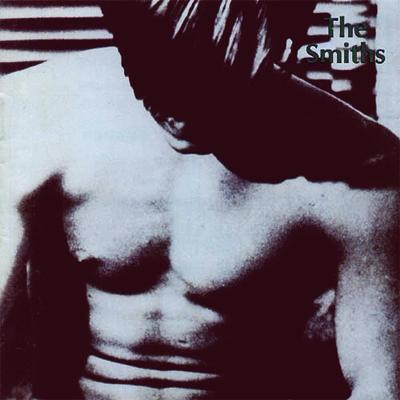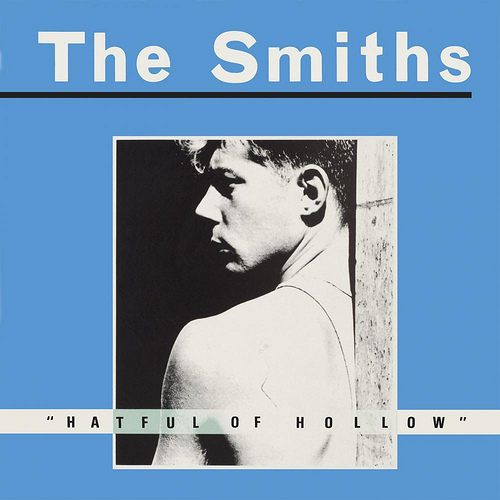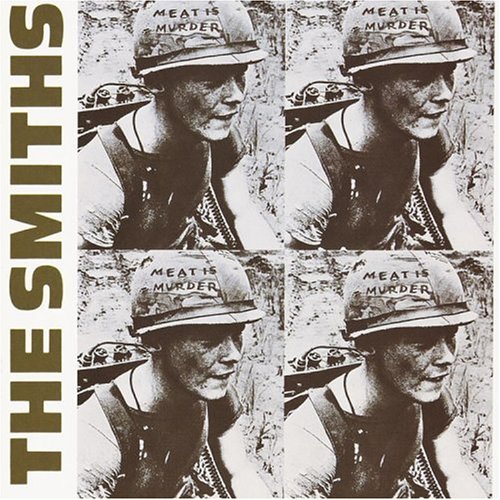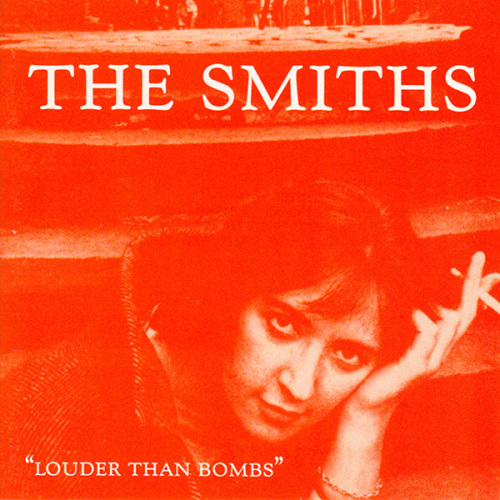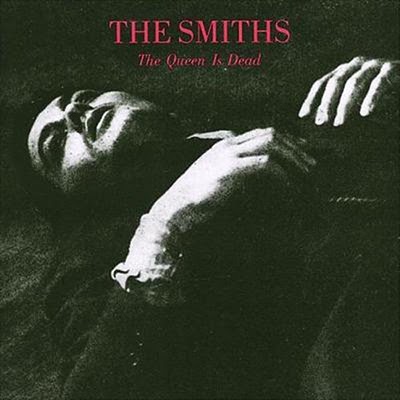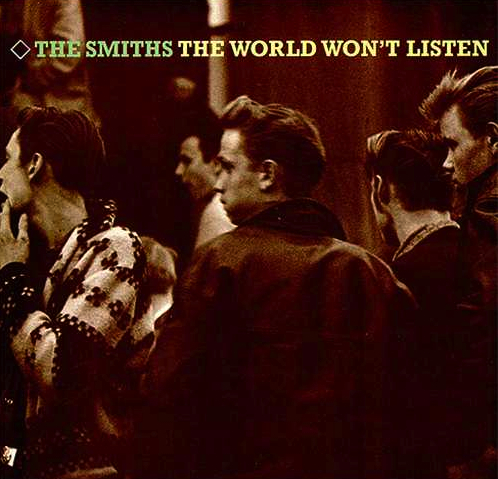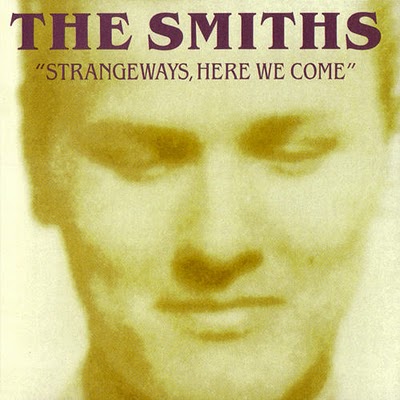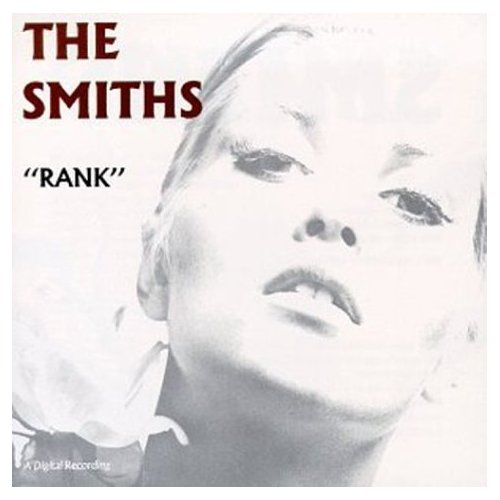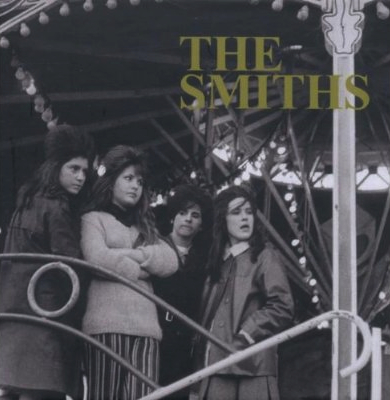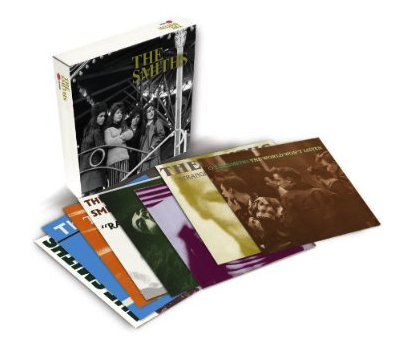
The Smiths
Complete
Rhino
Out Now
I love you is the inscription on Pandora's box.*
Why the Smiths still matter
There are two bands that have changed my life: the Ramones and the Smiths. In the late seventies, when punk rock emerged, I was only a teenager who couldn’t play guitar and I got left behind. By the early eighties I had been playing guitar for a few years and I was in a local band. And then we saw the Smiths on television and we all slapped our foreheads and said, “That’s what we’re supposed to be doing!” The Smiths provided the next logical step for twenty-something punks with a heart.
Definitive television moments: the assassination of JFK, the first manned moon landing and the Smiths miming their new single ‘This Charming Man’ on some early evening show, covered in petals. This was Autumn 1983 and no one outside of their home town of Manchester had really seen the Smiths before. Hmmm … four good-looking young men. The bass player and the drummer (we had no names at this point) were playing a fast, taut Motown-style backing (kind of like ‘Heatwave’) and the guitarist hid behind a fringe and played exactly like I wished I could. The singer had a sub-Eraserhead dry quiff, beads and an oversize shirt. And he was waving an enormous bunch of gladioli above his head. Different. There was nothing – and I mean nothing – like this on television music shows. I went out the next day and bought ‘This Charming Man’ in 12” and 7” formats (different b-sides, see) and I spent all Saturday night in my room playing them over and over again. I would have gone out that night but I didn’t have a stitch to wear … plus I was held spellbound by Morrissey’s abstruse lyrics, delivered in an old school crooning style, and the fluent guitar jangle of the Byrds played at 78rpm. I still get butterflies when I hear that chiming guitar intro. Nearly all the best songs have an intro that stands as a statement of intent. Witness ‘Tutti Frutti’ by Little Richard, or the Kinks’ ‘You Really Got Me’ – these intros say “shut up and listen to this!” In ‘This Charming Man’, the Smiths delivered a flawed gem – the chorus was a bit ploddy after each plangent verse – but they are forgiven, if only for the quality of the b-sides, particularly ‘Accept Yourself’ and ‘Jeane’. These songs laid out much of the Smiths’ future manifesto: personal politics (“I sat in my room and I drew up a plan”) delivered with arch wit (Morrissey’s reply to his own falsetto backing of “la la la la la…” is “…no heavenly choir”!); deceptively simple song structures executed with Marr’s single-minded intent; and record sleeves extolling the good old days when things were black and white, and film stars had perfect hair. And then I found out that ‘This Charming Man’ was their second single.
When I played ‘Hand In Glove’ for the first time, I knew the Smiths were going to be special. From the fade-in to the fade-out (perhaps to give the impression that you were witnessing a Love Without Beginning Or End) it is the perfect ‘us versus them’ love song with one classic line after another. Listen to the following and you will know that Morrissey means it: “the sun shines out of our behinds” and “we may be hidden by rags but we’ve something they’ll never have” ending, of course, with “I’ll probably never see you again”. Pedants complained that Morrissey’s singing was flat – it wasn’t and it didn’t matter – ‘Hand In Glove’ is the ultimate example of emotion over technique. Indeed, the mix was a little muddy – something that the band tried to remedy with a remix on the first LP. Ironically, although the band’s main musical asset – Johnny Marr’s guitar – was submerged on the original version, by making the song clearer on the remix the magic was lost, along with the definitive fades at each end of the song. Young people be advised: if you want to hear the original, buy it on the compilations that were released at the time, Hatful Of Hollow or Louder Than Bombs, not on the poorly assembled post-split collections that try to rewrite history. These things are important. ‘Hand In Glove’ instantly became my favourite song and to this day it remains one of my selections should I ever find myself marooned on a desert island. (Presumably one hopes that a working record player would also be miraculously washed ashore, along with pristine copies of ‘Ready Teddy’ and ‘Alison’ by the Elvises Presley and Costello respectively, Dionne Warwick’s ‘Walk On By’ and just about anything by Pixies, the Beatles, REM, the Ramones…) Why should the Smiths be this special? Any band that can emerge fully-formed and release a debut such as the often underrated ‘Hand In Glove’, closely followed by ‘This Charming Man’ is to be cherished. There were no false starts, no embarrassing ‘early disco years’; the Smiths ploughed their own furrow, and as such would come to be respected for that integrity.
Their first LP allowed us to put faces to the names and became the template for a thousand young bands across the country. The record seemingly had few overdubs, having the kind of simplicity that made the Ramones’ first LP a favourite of any fledgling guitarist. But listen more closely and the craftsmanship emerges: notice how subtly ‘The Hand That Rocks The Cradle’ builds in tempo and tension. This is no clumsy grunge-style ‘quiet verse, loud chorus’ exercise in dynamics. Note the guitar-only outro on ‘Pretty Girls Make Graves’; the kind of sublime guitar work that lesser bands would build an entire song around, is merely an extemporised fade-out to Marr and his exponentially increasing talent. Note all the lines that would become your favourites: “You can pin and mount me like a butterfly” and “I’m not the man you think I am” and “Oh Manchester, so much to answer for”. Try to pick out the guitar lines on ‘Still Ill’. Try not to sing along with “under the iron bridge…” Laugh at the crazed yodelling of ‘Miserable Lie’ and gasp at the poetry of ‘Suffer Little Children’. Wow.
As if all this wasn’t enough for 1984, the Smiths also released the Hatful Of Hollow compilation of b-sides, radio sessions and non-album singles. This remains one of the favourite LPs for Smiths apostles, perhaps because it is a reminder of the band’s extraordinary quality control. They often released singles that were never to appear on albums. Like the golden age of pop (no, I’m not sure when that was either…) singles were not merely trailers for forthcoming albums but stand-alone releases. So prolific were the band, they would issue top quality songs such as ‘William, It Was Really Nothing’ in between LPs. The b-sides were never less than brilliant; nowadays one has to be content with a CD single containing a dance remix and/or a live recording, as its extra tracks. No such problem for the Smiths. On ‘William’ their followers were rewarded with b-sides such as ‘Please, Please, Please, Let Me Get What I Want’ and ‘How Soon Is Now’. The former is guaranteed to be in any Smiths devotee’s top ten songs, the latter proved so popular that the record company subsequently issued it as a single in it’s own right! Hatful Of Hollow also contained the only recorded version of ‘This Night Has Opened My Eyes’, from a radio session. That a song of this calibre was merely a cast-off for the band was a measure of their embarrassment of riches. Apart from the original version of ‘Hand In Glove’ (don’t get me started), Hatful Of Hollow also includes more brilliant ‘filler’ (hah!) such as ‘Girl Afraid’ and ‘Back To The Old House’, both providing a lesson in Marr’s playing for bedroom guitarists everywhere. Five years later, this writer was still trying to unravel the helix-like guitar lines.
Most bands like to think their music progresses with each album. For bands like Nirvana and Oasis, the introduction of acoustic guitars seemed to be their idea of pushing forward their musical boundaries. By the third album, they proudly use a string section. Successive enhancements seem to have more in common with shifting units for The Man rather than artistic integrity and creativity. With each album, the Smiths actually did succeed in progressing musically. Their second album proper, Meat Is Murder, exhibited a huge leap in skills and ideas. Note the broad range of styles: the Elvis pastiche of ‘Rusholme Ruffians’ (later acknowledged on the live album Rank, as the song segues in and out of ‘Marie’s The Name Of His Latest Flame’); the rockabilly of ‘Nowhere Fast’; the choppy guitars of the danceable ‘Barbarism Begins At Home’; the rocking ‘What She Said’ and the songs such as ‘I Want The One I Can’t Have’ and ‘Well I Wonder’, the style of which came to be known as …erm…’Smiths-y’… Bedroom guitarists briefly switched their allegiance to bass for ‘Barbarism’, Andy Rourke’s finest moment, and Mike Joyce’s drums on ‘What She Said’ are still thunderous, despite the trebly reverb that blighted all ’80s records. The Smiths were always criticised for being dour and overly serious. Sure, songs such as ‘Meat Is Murder’ with it’s abattoir sound effects were never going to be a laugh-fest. However, Morrissey’s humour was rarely acknowledged. Note the lyrics of ‘Nowhere Fast’ – “I’d like to drop my trousers to the Queen” indeed. The problem was that either you understood or you didn’t. If you didn’t have tears in your eyes two minutes into ‘Well I Wonder’ then you were one of Them. The Smiths stood for the dispossessed, the disenfranchised and those who saw through all the bullshit rules that society sets up. To be seen wearing a Smiths t-shirt was to publicly announce that you were a thinking person, not fodder for the yuppie ethos of style over substance. When the Smiths had appeared on the BBC’s Top Of The Pops programme to play ‘Heaven Knows I’m Miserable Now’ Morrissey wore an old hearing aid. It later transpired this was a gesture of solidarity with a deaf fan who had written regularly to the singer. Most bands would be embarrassed to acknowledge that any fan of theirs was deaf – one can imagine the jokes aimed at Morrissey’s untutored singing – but this is what I’m talking about; the Smiths meant something. They weren’t just another bunch of puppets playing at popstars. Having rejected the chance to support the Police in their early days, the band continued to control all aspects of their music, even to the point of producing their own records from the second album onwards and to staying with an independent record label for as long as was tenable. Respect.
The consensus is that the Smiths’ third studio album features the band at its peak. When the band played ‘Bigmouth Strikes Again’ on BBC TV’s Old Grey Whistle Test they were on rollicking good form; they were often criticised for being a bunch of softies, but no one could charge the Smiths with ‘Failure To Rock’ during this period. The Queen Is Dead was released in 1986 and it does not contain one duff song. If you only buy one Smiths album … you’re a fool. However, for those on a budget, start with The Queen Is Dead. Again, there was a broad sweep of styles and Morrissey’s wit was still in evidence, the section of the title track which rhymed ‘spanner’ with ‘piano’ being a personal favourite. ‘Vicar In A Tutu’ – well, hey, the title said it all. ‘Some Girls Are Bigger Than Others’ was Carry On innuendo transposed to song. And there was plenty of material for those of us who were still clad in black, the prime example being ‘I Know It’s Over’. This was, and still remains, one of their best songs. If your heart doesn’t break as Morrissey sings “while they are in each other’s arms…” then you’re already dead. A perfect example of the songwriting craft, ‘I Know It’s Over’ ebbs and flows until it climaxes into a repeated circular one-line refrain that Morrissey sings in a different way each time. A true classic, and I don’t use the word ‘classic’ lightly. The whole album is a masterclass of guitar-based songs – note the economy of the keyboard strings on the album’s other classic, ‘There Is A Light That Never Goes Out’. Every alternative disco in the country rang with this song at some point in 1986; its singalong potential being obvious, even to Them – the non-believers. Listen to Morrissey’s fade-out vocal at the end of the song. I love the way he drops down on the seventh line, “There is a light and it never goes out”. Bloody marvellous.
How could they follow that? If Strangeways, Here We Come had been recorded by any other band, it would have been acceptable, but by the Smiths’ own high standards it was a disappointment. Their final studio album was recorded as the band fell apart. Suffering from mostly half-baked ideas and an over-egged production, the LP started with three dull tunes. There was some sort of plonking keyboard/xylophone on ‘A Rush And A Push…’ and a synthesiser/brass section on ‘I Started Something I Couldn’t Finish’ but not a single jangling guitar on either. ‘Death Of A Disco Dancer’ was an interminable plod through ‘Dear Prudence’ territory. With more keyboards. But just as you thought the band was suffering a shortage of ideas, along comes ‘Girlfriend In A Coma’. Classic title, tuneful guitars, witty lyrics and two minutes of prime time Smiths. ‘Unhappy Birthday’ also exhibited the Morrissey wit that elsewhere seemed to be sinking into subject matter that didn’t engage the listener on an emotional level – see ‘Paint A Vulgar Picture’. And of course, the album ends with Morrissey’s goodbye to Johnny Marr, ‘I Won’t Share You’. This is a lovely song that more than compensates for an otherwise ordinary album.
And ‘ordinary’ is not a word one should apply to the Smiths. The Smiths didn’t let you down. You want political songs for your punk sensibilities? Try ‘Panic’ or ‘Nowhere Fast’. Someone broke your heart? Apply ‘I Know It’s Over’ or ‘Unloveable’ until the pain subsides. Unrequited love? Plenty of options – ‘Well I Wonder’, ‘I Want The One I Can’t Have’, ‘The Boy With The Thorn In His Side’, or your choice here …. In a career lasting a little over five years, their quality control was second to none. They had a solid work ethic and they never released a poor album. They almost never released a song that you couldn’t defend. I’m serious. And that’s special.
The Smiths Complete is available as an eight-CD set, retailing at around £30, or an eight-record vinyl set, retailing at around £130. With the recordings painstakingly remastered by Johnny Marr, the set contains the four studio albums, the three compilations and the live album, Rank.
* Mason Cooley
Words by Neale Harmer
